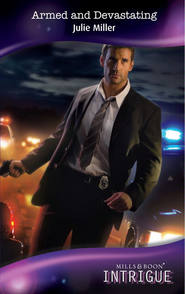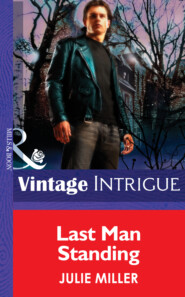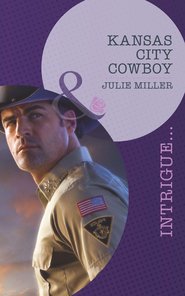По всем вопросам обращайтесь на: info@litportal.ru
(©) 2003-2025.
✖
The Marine Next Door
Автор
Год написания книги
2019
Настройки чтения
Размер шрифта
Высота строк
Поля
“You’re sure? This could bring up some painful memories.” He braced his elbows on the desk and leaned toward her. “And I won’t lie to you—Danny has been out of prison a couple of months now, hasn’t he? This has to be a particularly trying time for you. Nothing about this investigation will be easy.”
She should have known a cop as experienced and on-the-ball as Mitch Taylor would be aware of her ex-husband’s release from prison. Maybe he even considered her ex a person of interest because Danny Wheeler’s time locked up in Jefferson City roughly matched the gap in the Rose Red Rapist attacks. She didn’t know whether Danny would target any other woman except her, but then she hadn’t known the extent of the violence he was capable of when she’d married him either.
“I want to do this, Mitch.” This was her chance to prove to Chief Taylor that she was not only ready, but that she also deserved to make detective. It was also her chance to prove to herself that she truly had moved beyond the past that had once shadowed every aspect of her life. She was a fighter. A mother. A cop. A college graduate. She was nobody’s victim anymore. “Some things, no matter how difficult they are, are worth doing. I want to fight for these women—be their advocate if I can. I want to join your task force.”
Chapter Two
This was getting old.
John Murdock’s thick arms and thighs flexed easily as he lifted two more boxes of books from the back of his pickup and shut the tailgate. But his right knee ached, and shards of phantom pain radiated down into his ankle and foot. He’d been at this all day—long enough for the sun to go down outside—packing, carrying, unpacking, hauling some more. Even though he’d made the trip several times already without incident, habit had him checking the cars on either side of him, and behind each crumbling brick-encased support pillar as he limped across the cracked concrete of the parking garage below his building.
He wondered how long the pain that wasn’t really there would stay with him—possibly the rest of his life according to many of the doctors and therapists who’d worked on him. He wondered how long it would take before it stopped feeling like he was just going through the motions expected of him by civilized society, and he truly felt like he was home. He was getting used to the quizzical looks from strangers, setting him apart because they viewed him as some kind of hero or they felt sorry for him. Either option set his teeth on edge and made it hard to interact without second-guessing every word or gesture directed his way.
He wondered when he’d feel like celebrating surviving his last tour of duty in Afghanistan, when he’d feel like unpacking his Purple Heart, Silver Star and other medals and deployment ribbons. He wondered when he’d be ready for a beer with old friends or facing the job—and the woman he loved but could never have—that he’d left behind. It didn’t matter that he’d lived his whole life in Kansas City before reupping with the Corps. He felt like a stranger in his own town, with his own things, inside his own skin.
He’d left a part of himself behind on that roadside in Afghanistan. In more ways than one.
Returning to the Corps was supposed to have been a fresh start for him—coming home after his stint was up, the beginning of a brand-new chapter in his life. Yet he felt stuck, like nothing had changed. He’d loved the wrong woman, raised a sister who no longer needed him, given his spleen and a good part of his right leg, a couple of friends and half of his soul to the enemy he’d gone to fight.
Inside, he was still a long way from coming home.
Adding boxes of books and kitchen supplies, along with a few civilian clothes, to the boring beige of his furnished apartment didn’t do much to make this feel like a homecoming. But it got him out of the spare bedroom at his sister’s place so she could sell it and get on with marrying her fiancé. And, it was mindless exercise that tired him out and didn’t require much thought. Right now it was enough to feel less like a burden and to look forward to a decent night’s sleep.
John slowed when he heard footsteps ahead of him. Two sets of footfalls on the far side of that last pillar. He was a big enough man that it’d take a pretty bold mugger to come after him. But size alone wasn’t a deterrent if the perps were hyped up on some kind of drug or they took a closer look at his disability and mistook him for an easy mark—if there was a mugger at all.
Running into normal, everyday people who expected normal, everyday conversation out of him was almost more daunting than facing someone who wanted to hurt him. He’d been in survival mode for over a year now, and adjusting to normal was taking just as long as the psychologist who’d debriefed him when he’d mustered out had said it would.
The curve of a butt in navy blue slacks disappearing between the open doors of the garage’s elevator almost made him stop in his tracks as he rounded the last pillar and passed the wall of junction boxes and access panels and fire emergency equipment. So the challenge would be normal, everyday civility if he got on that elevator. Would the woman who owned those curves notice the empty pant leg? Or the carbon-fiber composite rod sticking out of his boot? Would there be a slew of curious questions or politely stilted silence as she avoided eye contact with him? Maybe she’d just stare at the scars on his neck, arm and hand. A vein ticked along the column of his throat as the relative tranquility of being alone warred with his common sense.
Who knew how long he’d have to stand there holding the heavy boxes before his ride returned again? The Corsican might be rich in architectural history and renovation potential, but the building had just the one elevator that ran to all ten floors. He might as well start dealing with normal, everyday now rather than putting it off indefinitely.
“Hold the elevator,” he called out, lengthening his stride.
The woman gasped. Maybe he’d just startled her. “Hurry up,” she muttered—to her companion.
John bristled at the whispered slight. Were they trying to get away? Maybe she’d gotten a glimpse of him as well and wasn’t thrilled about the idea of sharing the tiny space with him either. But if he could make the effort to be civil, then the woman attached to that backside could damn well do the same.
“Hold it,” he ordered in a sharper tone. He heard a “Mom,” and then a slender, tanned arm shot out to catch the door as he slipped inside. He looked straight into a pair of emerald-green eyes, silently telling the woman that he knew she’d tried to leave him behind. “Thanks.”
But when the doors closed and John retreated to the opposite corner to rest his boxes on the railing, he wondered if he’d made a tactical error. That verdant gaze, sparkling with defiance or warning or some other kind of intense emotion, followed him all the way to the back of the elevator before the woman blinked and turned away. Seeing her adjust her stance to position herself between him and the chestnut-haired boy with her made John wish he’d waited for the next ride up after all. Nice to meet you, too. He felt her wariness of him like a punch in the gut.
And he’d been worried about making small talk.
This woman meant business when it came to protecting her son from the big, bad strangers of the world. Despite the copper-colored hair twisted up in a bun at the nape of her neck, with a dozen fiery gold wisps popping loose to curl against her skin, she was no dainty female. She was tall, standing nearly six feet, judging by the mere five or six inches John topped her by when he normally towered over most women. She was in uniform and she was armed.
One hand rested on the butt of the GLOCK 9 mm holstered at her waist as she inched closer to the boy who was peeking at him from beneath the bill of his Royals baseball cap. John was pretty sure the protective-mama move was intentional when she turned so he could clearly see the KCPD badge hanging from the chain beneath her starched collar.
“What floor?” she asked politely enough. But her green eyes darted as though they were assessing his height and width and the distance between them.
“Seventh.”
“Travis.” She squeezed the boy’s shoulder beside the backpack he wore, drawing John’s attention to the fact that her skin wasn’t tanned so much as it was dotted with hundreds of freckles.
The boy, whom John put in the nine- to ten-year-old range, slipped his ball glove over the handle of the bat he carried before pushing the button and then twisting from his mother’s grasp. “Do you live on the seventh floor?”
Well, at least someone in this elevator didn’t think he was the spawn of the devil. “That’s why I’m going there.”
“We just came from baseball practice,” the boy announced. “I play in the outfield, but I want to be the second baseman or shortstop. Do you like baseball?”
“Trav.” The redhead chided her son in a soft tone that belied her tough-chick image. “What did I say about bothering people?”
“He’s no bother, ma’am.” Now where did that reassurance come from? He should have been happy she didn’t want to talk to him.
The boy named Travis tilted his face up to John’s, giving him a clear look at the inherited freckles sprinkled across his nose and cheeks. “I’m not supposed to talk to strangers, but Mom says I need to know all the neighbors on our floor in case she’s not home and I need to go to a safe place. We’re on the seventh, too. I’m Travis Wheeler.”
Safe place? Although there were other eighty-year-old buildings on this block that were in the process of being reclaimed like this one, one of the reasons John had chosen this particular neighborhood was so that his sister could stop in for a visit whenever she wanted to. The fact that Miranda Murdock was a cop, like this woman, didn’t matter. Big brothers looked out for their little sisters—even if she was engaged to a man who was just as protective of her as John.
This building was safe. The remodeled structure now surpassed fire codes and he’d been assured by the landlord that retired tenants and young professionals—not gnarly devil men who terrorized women and children—populated the place.
“I’m Captain—” normal, civilian conversation, remember? “—John Murdock. I work for the Kansas City Fire Department. Out of Station 23.”
“You’re a firefighter? Cool.”
“Sorry.” Mama clasped her hand over Travis’s shoulder and pulled him back to her without sharing her name and completing the introductions. “You’re new here?”
“Yes, ma’am. I’ve been deployed overseas or stationed in the DC area for a couple of years now. Moving in today.” There he went, making a rusty effort to put her at ease.
“What apartment?”
“709.”
“Mom, that’s right next door to us.”
“So it is.” The smile for her son faded when she faced John again. “Don’t worry, I’m not looking for babysitters. Travis won’t be stopping by.”
“I’m not a baby—”
“If he needs to—”
“He won’t.” John almost grinned at Travis’s frustrated groan when his overprotective mama hugged her arm across his chest. “There are plenty of other tenants in the building we tru—”
Her gaze wavered and dropped to the middle of John’s dusty gray-green T-shirt where she could read the letters USMC.
Trust?
Yep, no need to worry about polite civility with this woman. He was free to be his moody, isolated self, as far as she was concerned.
So why did it bother him that she turned away to watch the buttons for each floor light up without making direct eye contact with him again?











